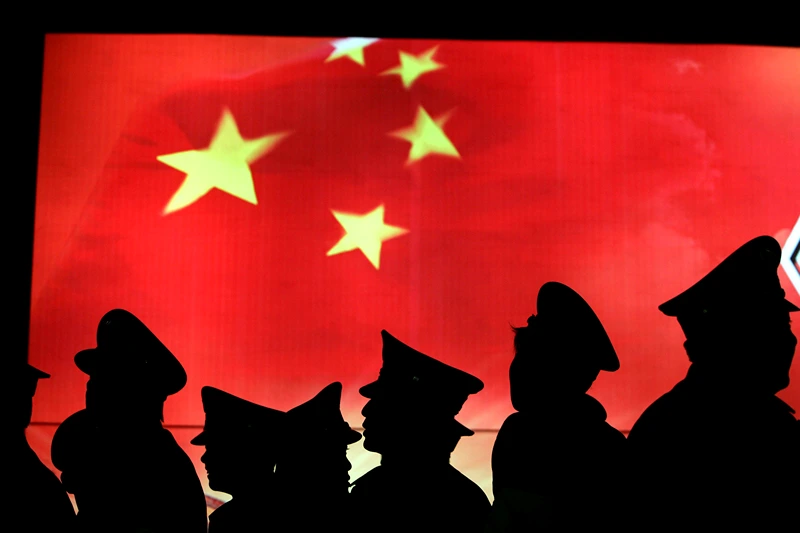
OAN Staff Blake Wolf
1:43 PM – Tuesday, August 6, 2024
Shujun Wang, a 76-year-old Chinese-American, is now facing up to 25 years in prison after being found guilty of espionage, working on behalf of the Chinese government.
Wang lived in Flushing, Queens, where he became an avid figure in the “Chinese pro-democracy movement,” which served as a disguise for his covert occupation as a Chinese agent.
Wang first came to New York in 1994 in order to teach in the U.S. after previously teaching at a Chinese university. This was the reason that he was granted citizenship.
Wang “was convicted today by a federal jury in Brooklyn on all four counts of an indictment charging him with acting and conspiring to act as an agent of a foreign government without prior notification to the U.S. Attorney General, criminal possession identification and making false statements to law enforcement,” A press release from the United States Attorney’s office said.
“The verdict followed a seven-day trial before United States Second Circuit Judge Denny Chin sitting by designation. Wang’s co-defendants in the espionage and transnational repression scheme, Feng He, Jie Ji, Ming Li and Keqing Lu are officials from China’s Ministry of State Security (MSS). They remain at large.”
Officials from the Federal Bureau of Investigation (FBI), as well as U.S. Attorney Breon S. Peace, also announced the verdict. Peace has served as the United States attorney for the Eastern District of New York since October 2021
“The indictment could have been the plot of a spy novel, but the evidence is shockingly real that the defendant was a secret agent for the Chinese government,” stated U.S. Attorney Breon Peace. “Posing as a well-known academic and founder of a pro-Chinese democracy organization, Wang was willing to betray those who respected and trusted him. When confronted with his shameful conduct, the defendant lied to law enforcement, but today’s verdict revealed the truth of his crimes and now he will face the consequences.”
The report goes on to recount how Wang earned the trust of the pro-Chinese democracy group, and how he would go on to report his findings to China’s Ministry of State Security (MSS), which is the country’s intelligence wing.
Wang would gather information on Hong Kong democracy protesters, Taiwanese independence advocates, Uyghur and Tibetan advocates, and others. He would then compose drafts of emails based on the conversations and meetings he attended. After that, instead of sending the emails, he would type the information in email drafts and Chinese officials would later log on to his email account to learn the information without leaving a trail of sent emails.
The press release also revealed that Wang had been working with the Chinese government since at least 2006, “under the direction and control of his co-defendants, four officials of China’s MSS, which is responsible for the PRC’s foreign intelligence collection. At the MSS’s direction, Wang gathered information on people and groups that the PRC considers subversive, such as Hong Kong democracy protests, advocates for Taiwanese independence and Uyghur and Tibetan activists, both in the United States and abroad.”
After Wang collected data and operational plans from the activist groups, he would attend “face-to-face” meetings with MSS officials in China and would use a software called “WeChat” to receive orders and to send and receive messages.
Although the evidence was seemingly insurmountable, Wang still pleaded not guilty.
“The jury felt they were and that was enough to convict him, even though there was no evidence that we he did caused any harm, was of any benefit to the Chinese government or that Professor Wang is anything other than a patriotic American who has devoted his life to fighting the authoritarian regime in China,” said Wang’s lawyer, Zachary Marguil-Ohnuma.
Wang’s case is a growing trend amongst U.S. efforts to combat the work of Chinese spy agencies.
David Laufman, a former chief of the Justice Department’s counterintelligence and export control section, said that in that past, DOJ officials “were still kind of coming to grips” with Chinese spying. “Those days are past,” Laufman continued. “Now, we’re seeing case after case being brought.”
Wang’s sentencing is set for January 9th.
Stay informed! Receive breaking news blasts directly to your inbox for free. Subscribe here. https://www.oann.com/alerts

